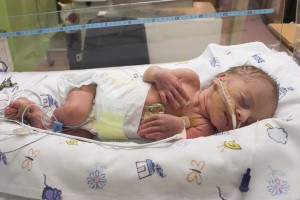Premature Babies and Heart Rate Monitors
Premature babies who are monitored using the Heart Rate Observation System (HeRo) experience more than a 20 percent reduction in mortality, a new study showed.
The randomized study included more than 3,000 infants who were born preterm in the neonatal intensive care units (NICU) at eight U.S. universities. The group of babies given standard NICU care showed a mortality rate of 10.2 percent, while those who received standard NICU care, as well as HeRO monitoring showed a mortality rate of 8.1 percent, the study found.

HeRO is a system for infants that monitors their hearts to detect early signs of distress that often signal an infection or other serious and potentially life-threatening illnesses. The system works by generating a number every hour that quantifies how prevalent abnormal patterns in each infant’s heart are. In this way, it helps medical care professionals make better-informed decisions regarding diagnostics and therapies for the infants.